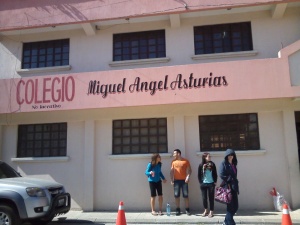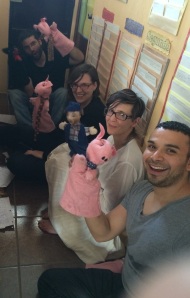This is a special guest post from a volunteer with Librarians Without Borders.
Wilting from grappling with the new copyright management software package at the academic library where I work, I was delighted to be offered the opportunity to travel to Guatemala with Librarians Without Borders, a not-for-profit organisation which supports sustainable libraries in areas where information poverty is a significant impediment.
Scarred by conflict since the arrival of the Spanish in the 16th  century, Guatemala has only recently emerged from civil war and is in the process of re-negotiating its national identity. Inspired by the gift of an exercise book in his youth, Jorge Chojolan founded the Miguel Angel Asturias Academy in 1995, in Quetzaltenango (localy referred to as Xela, pronounced “shayla”),Guatemala‘s second largest city. Asturias subscribes to the principles of Paulo Freire’s “Pedagogy of the Oppressed“, which foster critical thinking and the interrogation of divisive social norms.
century, Guatemala has only recently emerged from civil war and is in the process of re-negotiating its national identity. Inspired by the gift of an exercise book in his youth, Jorge Chojolan founded the Miguel Angel Asturias Academy in 1995, in Quetzaltenango (localy referred to as Xela, pronounced “shayla”),Guatemala‘s second largest city. Asturias subscribes to the principles of Paulo Freire’s “Pedagogy of the Oppressed“, which foster critical thinking and the interrogation of divisive social norms.
Poverty is a major obstacle to nurturing a culture of reading for pleasure in Guatemala. Books in the home are a rarity. Asturias often struggles to service the educational needs of its students, given the limited library resources at hand. It also works to establish reading as recreation and to dispel a conception of the library as merely a homework space. The team of twelve from Librarians Without Borders contributed towards the deconstruction of this perception with a Library Day program catering to students from kindergarten to high school. Younger children were treated to a puppet show adaptation of The  Three Little Pigs which encoded a theme of knowledge as power, and books as the source of knowledge. Older students played a True/False game, illustrated a comic jam and composed their own poems. These activities were complemented by the physical layout of the library, which has structured and informal seating (no shoes permitted!) and book displays coinciding with the monthly social-awareness topics. These topics include human rights, discrimination, and ecology, for example. Asturias has been promoting a respect for library books as a community resource over the last few years, and I felt proud to witness the first check-out as part of a pilot project to allow students to take books home with them.
Three Little Pigs which encoded a theme of knowledge as power, and books as the source of knowledge. Older students played a True/False game, illustrated a comic jam and composed their own poems. These activities were complemented by the physical layout of the library, which has structured and informal seating (no shoes permitted!) and book displays coinciding with the monthly social-awareness topics. These topics include human rights, discrimination, and ecology, for example. Asturias has been promoting a respect for library books as a community resource over the last few years, and I felt proud to witness the first check-out as part of a pilot project to allow students to take books home with them.
Chajul is in the Guatemalan Highlands and part of the indigenous Mayan Ixil (“eesheel”) community. The women’s traditional woven clothing makes a dramatic tapestry of the steep streets, above which rear the hills from which guerrilla fighters instigated their campaigns over the course of the civil war, during which Chajul suffered severe casualties. During the war, many parents kept their children at home and so schooling has been gaining currency again over the last two decades.
There is also an adult education program in Chajul, aiming to address the high levels of adult illiteracy (75% of the local population) and managed by volunteer students. Limitless Horizons Ixil established a community library in Chajul in 2010, which serves 1500 members. Like Asturias, it offers an environment in which homework and study can be undertaken. Local homes are generally not conducive to study, as there is little personal space and incidence of domestic violence is comparatively high. Staff and supporters also wish to embed a culture of recreational reading in addition to advocating literacy as a means to empowerment. As the staff librarians already offer a program of activities to incubate the desire to read, the children were very receptive to the story-time events planned and lead by the Librarians Without Borders team. There were a number of knowledge transfer opportunities with the local and visiting librarian staff. Librarians Without Borders participants shared their collective experience with a view to helping the Chajul librarians make decisions about the opportunities and difficulties with which they are confronted.
A masterful ruse by the local team is to tell the children that there are hidden cameras concealed around the library premises to encourage the children to self-regulate their behaviour within the library. My amusement was curtailed, however, by a chance comment by one of the local librarians in relation to theft: it occurs rarely and when it is detected, the librarians ask the child to explain why he or she stole from the library. It is sobering to hear that the response is usually “Because I love this book and I have none at home”. Working in an environment which is so information rich that it has to routinely destroy reading resources due to storage pressures, I am struck by the injustice of a child not having a single book of his or her own. This remains my most abiding memory of Guatemala, and rightly so.



